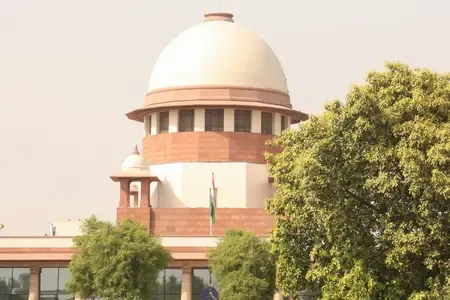Should the Pegasus Report Be Kept Private to Safeguard National Security?

Synopsis
The Supreme Court's recent ruling on the Pegasus report raises critical questions about national security and individual privacy. As the court balances these interests, the implications for citizens and governmental oversight are profound. This article explores the court's decision, the nature of Pegasus spyware, and the ongoing debate over privacy and security in India.
Key Takeaways
- Supreme Court prioritizes national security over public disclosure of the Pegasus report.
- The report raises crucial issues regarding privacy rights and surveillance.
- Expert committee highlights the need for enhanced cybersecurity measures.
- Five out of 29 examined phones showed possible malware infection.
- The government has faced criticism for inadequate cooperation in the probe.
New Delhi, April 29 (NationPress) — On Tuesday, the Supreme Court expressed its disapproval regarding the public disclosure of a report from a court-appointed committee investigating the Pegasus surveillance allegations. A bench comprising Justices Surya Kant and N.K. Singh stated that the court will not permit the revelation of any details that pertain to the security and sovereignty of the nation, though information regarding individuals may be disclosed.
They affirmed, “Any report that touches upon the security and sovereignty of the country will remain undisclosed. However, individuals wishing to know if they are named can be informed.”
During the hearing, Justice Kant noted that there is “nothing wrong” with a nation employing spyware for security purposes. He remarked, “What is wrong if a country utilizes spyware? The critical question is against whom it is deployed. We cannot compromise the security of our nation. Individual rights to privacy, as safeguarded by the Constitution, will be respected.”
The court decided to postpone further hearings until July 30, following a request from the petitioners to present a judgment from a U.S. court regarding WhatsApp's case against Pegasus.
Pegasus spyware, developed by the Israeli cyber-intelligence firm NSO Group, is notorious for monitoring mobile phones and extracting data, often used to surveil politicians, government officials, human rights defenders, activists, and journalists.
In October 2021, a bench led by then Chief Justice of India N.V. Ramana established an expert committee to investigate whether Pegasus spyware was utilized against Indian citizens, including journalists and activists, to access stored data.
Solicitor General Tushar Mehta, representing the government, declined to provide specifics on whether Pegasus was employed, citing potential impacts on national security. However, the Supreme Court emphasized its commitment to uphold the rule of law without delving into the “political thicket,” acknowledging the serious implications of the alleged use of Pegasus against citizens.
In August 2022, the Pegasus panel reported to the Supreme Court that it could not definitively establish the presence of the controversial spyware on 29 examined mobile devices, and criticized the Central government for its lack of cooperation in the investigation.
The panel indicated that while five out of the 29 mobile phones may have shown signs of malware, it did not conclusively mean they were infected by Pegasus spyware.
Headed by retired Supreme Court judge R.V. Raveendran, the panel stressed that the government had not adequately assisted in the malware examination process.
The report comprised three sections: findings from the technical committee, digital analyses of the phones checked for spyware infection, and the overseeing judge’s report. The then CJI Ramana-led bench suggested that it might publish the report from Justice Raveendran, while other parts would likely remain confidential. The report highlighted the need for enhanced cybersecurity measures while ensuring that citizens' privacy is protected, advocating against unauthorized surveillance.
It warned that certain malware could be misused, posing security threats and infringing on citizens' privacy. The panel recommended establishing mechanisms to prevent illegal surveillance, advocating for the prosecution of private firms involved in such activities.









